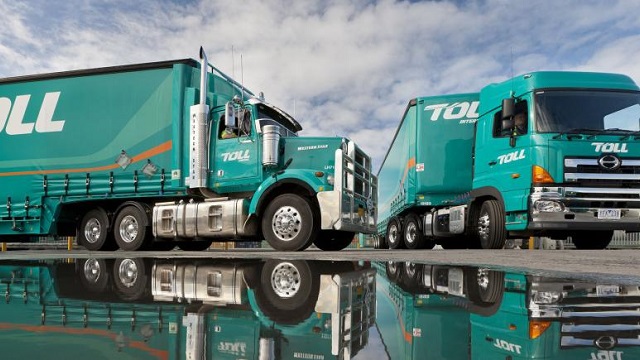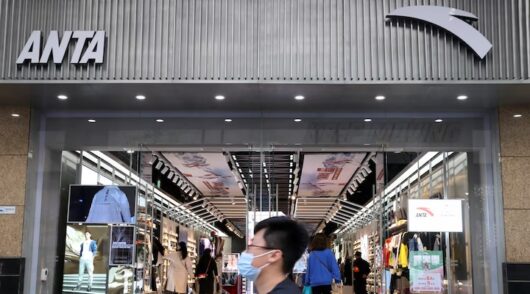The knock-on effect of a Transport Workers Union (TWU) strike last Friday involving thousands of Toll truck drivers could continue to disrupt deliveries this week, according to a supply chain consultant familiar with the issue. “The impacts to Toll customers and customers of Toll customers may continue to be felt this week, as backlogs from freight not carted and delivered on Friday are cleared and idle resources rebalanced across the network,” Glenn McCully, senior consultant at
at supply chain consultancy TMX, told Inside Retail.
He said that while Friday’s strike was disruptive, for now it is the only planned protected action to be taken by the TWU.
TWU members went on strike after discussions with Toll over a new enterprise bargaining agreement broke down.
Toll is offering a 2 per cent pay rise for the next two years, but the TWU is pushing for a 3 per cent pay rise and increased job security.
Toll, however, said in a statement that the TWU refused to continue discussions and proceeded with strike action, despite Toll’s efforts to improve conditions for employees.
“Unfortunately, only Toll is making any effort to compromise in these negotiations. The union has shown little compromise. They continue to present a list of demands that hurt the company and make jobs less secure,” president of Toll’s Global Express business, Alan Beacham, said.
Toll said its employees are already amongst the best paid in the industry and the company has the best safety record in the sector. It said it “will not be bullied by the union” and “will not allow the Australian public to be held to ransom at the behest of the TWU leadership”.
TWU has not responded to requests for comment.
Fears over casualisation of the labour force
McCully points out that TWU members rarely take protected strike action, which suggests that there are very strong concerns about rates of pay and the casualisation of the labour force.
“Disruption in the last mile delivery space from e-commerce players and retailers has led to a rise in low-cost casual delivery workers through technology platforms that aggregate casual delivery drivers,” McCully said.
“We have seen levels of exploitation of these workers in Europe and with delivery cost pressure dynamics playing out here in Australia, TWU members likely want to avoid this scenario here in Australia.”
Earlier this week, Amazon’s Flex delivery service came under fire for unfair working conditions for its delivery contractors. Flex drivers must fit all their deliveries into a four hour window. If they take too long they must either return packages to the distribution centre and receive a warning, or attempt the deliveries in their own time for no extra pay.
The ABC spoke with multiple drivers that described low pay, unreasonable expectations and unsafe working conditions. Amazon pushed back against these claims saying the average driver earns $120 per hour hour delivery block, which is in line with relevant owner-driver laws, and that it doesn’t believe its expectations are unreasonable.
Asian countries like South Korea are already feeling the effects of delivery worker exploitation. In June, over 2000 of South Korea’s delivery workers staged a week-long strike action after employers failed to stick to an agreement to prevent overwork.
Members of the Parcel Delivery Workers’ Solidarity Union began striking last year after a record 16 deaths were blamed on overwork. Under a tentative deal reached on June 16, delivery workers will be exempt from sorting parcels, a major contributor to exhaustion and overwork, and will work no more than 60 hours a week, starting from January 1.
Further disruption ahead
Although Toll and TWU are still in negotiations, the TWU has flagged potential for future action. And while it’s too early to tell how long this dispute will last, there are indications that it’s just the beginning of further revolt in the transportation industry.
“In addition to the Toll dispute, it’s estimated that up to five major freight and logistics companies and around 15,000 drivers nationally could be impacted by this type of action,” McCully said.
“Last week, drivers at Bevchain, a subsidiary of Linfox, lodged an application with Fair Work Australia to take protected action, meaning the action taken by Toll drivers may be an early indicator of ongoing disruptions.”
The only way forward, according to McCully, is for the whole of the transport industry to work collaboratively to solve the issues.
“The sector needs to take a long-term view in determining how technology and digitalisation can make the industry more efficient whilst maintaining high levels of service, safety and compliance,” he said.
“Companies that invest in transport management systems and logistics control towers with high capability in capacity and route optimisation technology can make last mile delivery fleets more cost efficient and sustainable.”
He believes an optimised transport network would reduce the ongoing focus on driver pay rates.







